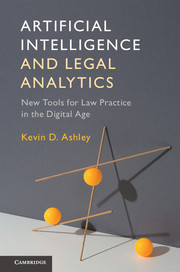Book contents
- Frontmatter
- Dedication
- Contents
- List of illustrations
- List of tables
- Acknowledgments
- PART I COMPUTATIONAL MODELS OF LEGAL REASONING
- 1 Introducing AI & Law and Its Role in Future Legal Practice
- 2 Modeling Statutory Reasoning
- 3 Modeling Case-based Legal Reasoning
- 4 Models for Predicting Legal Outcomes
- 5 Computational Models of Legal Argument
- PART II LEGAL TEXT ANALYTICS
- PART III CONNECTING COMPUTATIONAL REASONING MODELS AND LEGAL TEXTS
- Glossary
- Bibliography
- Index
1 - Introducing AI & Law and Its Role in Future Legal Practice
from PART I - COMPUTATIONAL MODELS OF LEGAL REASONING
Published online by Cambridge University Press: 13 July 2017
- Frontmatter
- Dedication
- Contents
- List of illustrations
- List of tables
- Acknowledgments
- PART I COMPUTATIONAL MODELS OF LEGAL REASONING
- 1 Introducing AI & Law and Its Role in Future Legal Practice
- 2 Modeling Statutory Reasoning
- 3 Modeling Case-based Legal Reasoning
- 4 Models for Predicting Legal Outcomes
- 5 Computational Models of Legal Argument
- PART II LEGAL TEXT ANALYTICS
- PART III CONNECTING COMPUTATIONAL REASONING MODELS AND LEGAL TEXTS
- Glossary
- Bibliography
- Index
Summary
INTRODUCTION
Artificial Intelligence and Law (AI & Law), a research field since the 1980s with roots in the previous decades, is about to experience a revolution. Teams of researchers in question answering (QA), information extraction (IE), and argument mining from text planted the seeds of this revolution with programs like IBM's Watson and Debater and the open-source information management architectures on which these programs are based. From these seeds, new applications for the legal domain are sure to grow. Indeed, they are growing now. This book explains how.
Programs like Watson and Debater will not perform legal reasoning. They may be able to answer legal questions in a superficial sense, but they cannot explain their answers or make legal arguments. The open-source text analysis tools on which they are based, however, will make a profound difference in the development of new legal applications. They will identify argument-related information in legal texts that can transform legal information retrieval into a new kind of conceptual information retrieval: argument retrieval (AR).
Computational models developed by AI & Law researchers will perform the legal reasoning. The newly extracted argument-related information will connect the computational models of legal reasoning (CMLRs) and argument directly with legal texts. The models can generate arguments for and against particular outcomes in problems input as texts, predict a problem's outcome, and explain their predictions with reasons that legal professionals will recognize and can evaluate for themselves. The result will be a new kind of legal app, one that enables cognitive computing, a kind of collaborative activity between humans and computers in which each performs the kinds of intelligent activities that they can do best.
This chapter introduces the subject of AI & Law and explains the role it will play in light of the new technologies for analyzing legal texts. It explains how these technologies enable new tools for legal practice using computational models of legal reasoning and argumentation developed by AI & Law researchers.
Some questions addressed in this chapter include: What is the subject of Artificial Intelligence and Law? What is a CMLR? What are the new technologies for automated QA, IE, and argument mining from texts?
- Type
- Chapter
- Information
- Artificial Intelligence and Legal AnalyticsNew Tools for Law Practice in the Digital Age, pp. 3 - 37Publisher: Cambridge University PressPrint publication year: 2017
- 1
- Cited by



